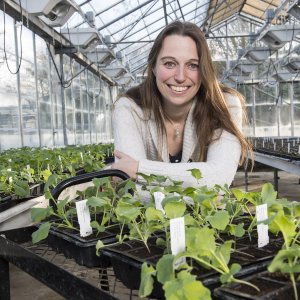
Rachel’s research programme involves the utilisation of both natural and induced genetic variation and facilitating the translation of research from model species to crops. She has a keen interested in developing Brassica resources.
Rachel’s research group has a focus on oilseed rape pests, with a strong focus on cabbage stem flea beetle, including a collaborative project with industry to identify genetic markers that can be used by breeders in the development of oilseed rape varieties that are less palatable to the beetle. The team uses captive CSFB, to study CFSB development and genetics, and controlled and field plant variety screens for both adult and larval CSFB damage in Brassica napus and related species such as Sinapis alba. These experiments can be used to look at plant-pest interaction and ultimately determine the genes and mechanisms associated with pest resistance. This work is complemented by collaboration with the University of Hertfordshire on disease resistance.
The second part of Rachel’s research program focusses on understanding how genetic variation and the environment impact crop phenotype, including the use of speed breeding, gene network models for flowering (with Richard Morris) and Brassica oleracea head morphology (with Enrico Coen). She is supporting the development of a Multi-parent advanced generation inter-cross (MAGIC) population with Steven Penfield and Rothamsted research.
Rachel was awarded an Honorary Associate Professorship from the University of East Anglia in 2024.
Selected Publications
- Jacott C, Schoonbeek HJ, Sidhu GS, Steuernagel B, Kirby R, Zheng X, Von Tiedermann A, Macioszek VK, Kononowicz AH, Fell H, Fitt BDL, Mitrousia G, Stotz H, Ridout CJ, Wells R (2024)Pathogen lifestyle determines host genetic signature of quantitative disease resistance loci in oilseed rape (Brassica napus)Theoretical and Applied Genetics (137 (65))Publisher's version: 1432-2242
- Jones DM, Hepworth J, Wells R, Pullen N, Trick M, Morris RJ (2024)A transcriptomic time-series reveals differing trajectories during pre-floral development in the apex and leaf in winter and spring varieties of Brassica napus.Scientific reportsPublisher's version: 2045-2322
- Yalcin HA, Jacott CN, Ramirez-Gonzalez RH, Steuernagel B, Sidhu GS, Kirby R, Verbeek E, Schoonbeek HJ, Ridout CJ, Wells R (2024)A complex receptor locus confers responsiveness to necrosis and ethylene-inducing like peptides in Brassica napus.The Plant journal : for cell and molecular biologyPublisher's version: 0960-7412
